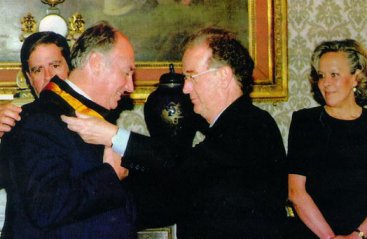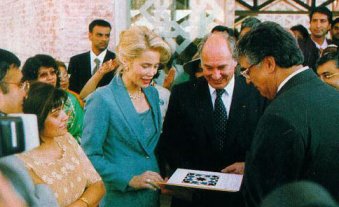
Your Excellency Mr. President of the Republic,
Your Excellency the President of the Parliament,
Your Excellency the Representative of the Prime Minister,
Your Worship the Mayor of the City of Lisbon,
Your Excellencies,
Distinguished Guests,
Before addressing
you about this Ismaili Centre, please let me express our
sympathy and
concern, on behalf of the Ismaili Community of Portugal and
myself, for
the people of the Azores who suffered so terribly in Thursday's
earthquake.
Large segments of the world's Muslim population, including the
Ismailis, reside
in zones of the world which are subject to seismic
disturbances,
so we are very familiar with their destructive consequences,
and the trauma
that lingers in their aftermath. We therefore share, in a
particularly
personal manner, in this tragedy.
Despite these
sad circumstances, it is a distinct honour and a very great
pleasure for
me to welcome you to this special place on this important day.
This is an occasion
charged with symbolism. Each of its elements carries
meaning that
is rooted in rich history, while also reaching confidently and
optimistically
into the future. First there is this gathering of distinguished
individuals,
and the many institutions and activities they represent. Next
there are the
exciting spaces and places of these new buildings, fine
additions to
the number of Ismaili Centres in major cities around the world,
and to Lisbon's
rich collection of distinctive structures, historic and
contemporary.
Finally, today is a very special day for the community I lead,
and for me personally,
the 41st anniversary of
my accession as Imam of the
Shia Ismaili
Muslims, as designated by my grandfather and predecessor, Sir
Sultan Mohamed
Shah, Aga Khan.
May I begin by expressing
my gratitude to all those individuals who have
contributed
to making possible this day, and what it commemorates. I would
start by thanking
the Government of Portugal for the supportive welcome it
has extended
to the Ismaili community over the years. This policy has
enabled a community,
many of whom arrived essentially as refugees from
Mozambique and
other parts of Portuguese-speaking Africa and Asia, to
reconstitute
itself and become productive and contributing members of
Portuguese society
within one generation.
The inauguration
of the Centro Ismaili today symbolises both the welcome
accorded by
the Government of Portugal, the response of the Ismaili
community to
this land of harmony and opportunity, and its permanent
commitment to
Portugal. These new buildings and the spaces within and
around them,
are rich in symbolism, drawing on the plurality of cultures
which characterise
Ismailis here, and around the world. The array of
facilities included
is a reflection of the core values of the Ismaili community,
its organisation,
its discipline, its social conscience, the importance of its
community organisations
and its attitude toward the society in which it
exists. In addition
to the prayer hall, there are classrooms, meeting rooms,
offices for
the Aga Khan Development Network, a lecture and social hall,
and exhibition
spaces. I thank the Government for its assistance in the
development
of this very special centre as the permanent focus of the
community's
spiritual and social activities and a base for its continuing
contribution
to the life of the country.
I would also
like to thank the City Council for assistance in obtaining the
site for the
Centre, and His Worship Mayor Joao Soares, and his team of
city officials
and staff for their understanding and support through all of the
phases of what
has been a very complex project. Among all his other duties
and responsibilities,
His Worship honoured us and this project by taking the
time to approve
the building permit personally. A great deal of construction
has taken place
in this wonderful city in the last few years. We have
appreciated
the helpful attention of the City's officials during a period of
great activity
and extreme pressure on all.
This is also
an appropriate occasion to acknowledge and thank those who
have made it
possible, the actual construction of the Centre
Donors have been
critical to the effort to give the Lisbon Ismaili Centre the
profile that
is appropriate to its location and mission. You should know of my
warm gratitude,
and my admiration for your generosity, and that these
thankful feelings
are those of many around the world. This is an
accomplishment
for the entire community.
To the architects,
Mr. Raj Rewal and Mr. Frederico Valsassina, I extend
my heartfelt
compliments for the conception and execution of a truly
remarkable complex
of structures and spaces. As something of a student of
Islamic architecture
myself, I feel a certain familiarity as I move through a
complex whose
evocative elements are drawn from the building traditions of
various Muslim
communities around the world. Yet the innovative use of
local and contemporary
materials, the integration of features and patterns
inspired by
traditional Portuguese architecture, and the technological
solutions to
some of the building's most demanding and innovative structural
features, place
the dominant characteristics of this inspiring complex in the
fresh and thoroughly
contemporary context of this dynamic capital city. A
remarkable achievement!
There are many
others to recognise for their contributions. I thank the
Contractor Messrs.
Soares da Costa, the Project manager and the speciality
sub contractors
who have worked so effectively to advance the construction
process in a
very tight time frame. The sub contractors handling the stone
work played
a critical role in the realisation of the project, and deserve
special mention.
Congratulations to the Structural Engineer, Consultant
Julio Appleton,
for his innovative use of pre-stressed cables in the cupola
ceiling in the
prayer hall, and of granite in the geometric trellises as
structural members.
My thanks as well to the consultants and artists
including Manuel
Cargalerio, Karl Schlamminger, and Raoul Rewal for their
distinctive
contributions.
I would like
to express my gratitude and admiration to members of our own
organisation
and community here in Portugal and my Secretariat in France
for the care
and attention they have given to this project, spread over many,
long, working
days. I want to acknowledge - and forgive me as it is a
member of my
own family - the contributions of my brother, Prince Amyn
Aga Khan whose
taste and talent I salute and rely upon, for his special
attention to
design issues, tiles, fountains, soft and hard landscape. Of the
many others,
all of whom I cannot name here, who kept this undertaking
moving forward,
Nizar Shariff deserves special mention. Finally, everyone
who has visited
the site over the past months has commented on the sense
of engagement
and enthusiasm of everyone working here, labourers and
volunteers alike.
To these people whom I cannot name individually, I would
like to convey
my deepest and most heartfelt thanks. I am most grateful for
the creativity,
energy, and attention to both the overall conception and the
many details
of this project, which render it distinctive, now, and I hope, for
the future.
It is to the
future that I would now like to turn my attention. We live in a
time of accelerating
change, evidence of which surrounds us on a daily basis.
Change can mean
stimulation, opportunity, and hope, but it can also mean
disorientation,
dislocation, and even conflict. Change can mean progress,
but it can also
mean that special efforts are required to improve access to
benefits of
development for those less prepared to take advantage of them.
These countervailing
forces of change are of great interest to me because
Ismailis have
felt their full brunt over the course of their long history. But
even more importantly,
they are a matter of religious concern. Islam
teaches Muslims
to strive to achieve equilibrium between human existence
and the Absolute,
and therefore to attend to both spiritual and physical
needs. As Imam
of the Shia Ismaili Muslims, my responsibilities extend to
both the spiritual
and material welfare of the Ismaili Community.
Pursuant to supporting
improvements in material well-being, I have created
a number of
development agencies, known collectively as the Aga Khan
Development
Network. The Network is a family of institutions sustained by
the Imamat and
the Ismaili community to realise the social conscience of
Islam through
institutional action. The agencies of the Network have distinct
but complementary
mandates with respect to economic development, social
development,
and the enhancement of culture. They work in countries where
Ismailis reside,
addressing problems experienced by citizens, irrespective of
their ethnicity
or religion.
Although my faith
and office place upon me a distinctive perspective and
role, I am most
certainly not alone in my concern about the pace and
direction of
change at this moment in history. In recognition of the critical
problems of
human welfare confronting today's world, and the role Faiths
can play in
contributing to their resolution, Dr. George Carey, the
Archbishop of
Canterbury, and Mr. James D. Wolfensohn, President of the
World Bank,
convened a dialogue on "World
Faiths and Development"
earlier this
year. Leaders of nine world Faiths participated: Baha'i,
Buddhist, Christian,
Hindu, Jain, Jewish, Muslim, Sikh and Tao. Within
each, the major
traditions were represented, the Christians by both Catholic
and Protestants
leaders, the Muslims by leaders of Sunni and Shia
communities.
The dialogue
took the form of an open and wide-ranging exchange of views
among the participants.
It concluded with a public commitment to continue
the Dialogue
and to the development of specific follow-on activities. Several
points emerged
which are important and encouraging. I was particularly
struck by the
degree of commonality in the ethical basis that motivates and
guides the development
work of all the Faiths. To find that similarity in
Judaism, Christianity,
and Islam, all of which share common Abrahamic
roots, was anticipated
and comforting. But to discover the extent and
strength of
comparable formulations among the religions that have their
origins further
East was exhilarating for our common goals.
The Dialogue
has now moved to the creation of working groups with
membership drawn
from both The World Bank and the Faiths. They are
charged with
drawing lessons from successful projects addressing some of
the most pressing
problems of our time: food, security, post-conflict
reconstruction,
delivery of social services, and the role of culture and
cultural institutions
for healthy societies. This process will focus on the work
of Faith organisations
in different geographical settings, and will seek to
identify best
practices. One goal is to lay the groundwork for cooperation
between Faith
organisations and development organisations including the
World Bank.
Another, and it is one to which I attach particular importance,
is to explore
the potential for cooperation between Faith organisations in
settings where
interests are shared and the environment enabling.
In this connection,
I would like to compliment the Government of Portugal
on the Law on
Religion Freedom currently being discussed in the country. It
is a pioneering
and forward-looking undertaking that will encourage a new
era of religious
freedom, respect, and equality for over 60 different religious
communities
in the country, while maintaining the historic role of the
Catholic Church.
The draft Law on Religious Freedom can serve as a model
for the rest
of the European Community where populations have grown more
ethnically and
religiously diverse in the past three to four decades. In a
more immediate
sense, I believe that the proposed law will provide a basis
for greater
cooperation between Faith communities in Portugal along the
lines envisaged
in the World Bank's Interfaith Dialogue. If experience
elsewhere is
a guide, we can expect the release of much energy and
creativity,
and the Government and people of Portugal should be assured
that the Ismaili
Centre of Lisbon, and all those it represents - the Ismaili
community worldwide,
and the agencies of the Aga Khan Development
Network - will
devote their energies to making Portugal's leadership in this
creative and
uniquely exciting initiative the success it must be. Social
harmony coupled
with the freedom and respect of religious expression is a
prerequisite
for all human progress.
Thank you.

 Back to Ismaili Web
Back to Ismaili Web